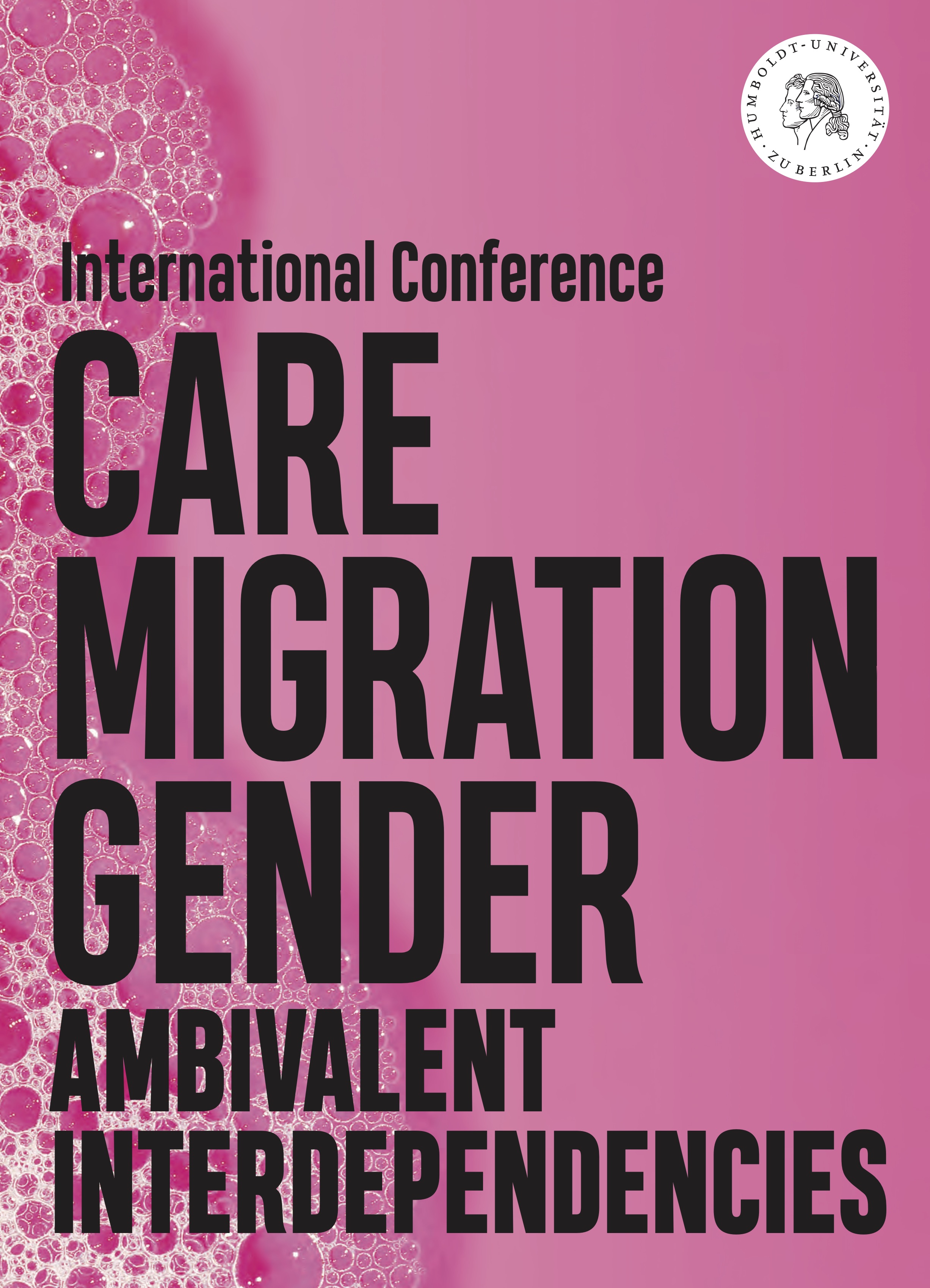Socialities and Gender in Care. Domestic Migration in India
DOI:
https://doi.org/10.17169/ogj.2021.117Keywords:
Care Relations, Gender, MigrationAbstract
How do processes of migration affect and get shaped by the apparently inescapable gendering of care work across the many differences and hierarchies among women in diverse contexts? How can we map the patterns of migration, gender and paid work with the relations and mutualities of being necessary and desired in care? Much of the discussion on gender, care, and migration has focussed on international female migrant care workers. The large numbers of domestic migrants and the variety of their work is barely acknowledged in this literature. The literature on domestic migration has also tended not to account for the complexity of gender and labour of people on the move. This paper examines the reworkings of the nexus of gender and care within three streams of domestic migration in India, drawing largely on a wide range of ethnographic studies. They are viewed in terms of movements in and out and through networks of social relations, where care relations are built anew in and through their spatial movements.
References
Agnihotri, Indu/Mazumdar, Indrani /N. Neetha (2012): Gender and Migration. Negotiating Rights – A Womens Movement Perspective (Key Findings). New Delhi: CWDS. https://www.cwds.ac.in/wp-content/uploads/2016/09/GenderMigrationNegotiatingRights.pdf (07.08.2019).
Banerjee, Narayan/Ray, Lokenath (1991): Seasonal Migration. A Case Study from West Bengal. New Delhi: CWDS. (mimeo). https://www.cwds.ac.in/wp-content/uploads/2016/11/SeasonalMigration1.pdf (07.08.2019).
Carstens, Janet (2013): What kinship does—and how, HAU: Journal of Ethnographic Theory 3(2), 245–51. doi: 10.14318/hau3.2.013
Centre for Women’s Development Studies (CWDS) (2020): The Neglected Dimension. Gender in India’s Labour Migration Story. Webinar, 20 June 2020. https://www.youtube.com/watch?v=NkpTGexHS1A (24.06.2020).
Chancel, Lucas/ Piketty, Thomas (2017): Indian income inequality, 1922-2014. From British Raj to Billionaire Raj? CEPR Discussion Paper No. 12409.
Coffey, Diane (2013): Children‘s Welfare and Short-term Migration from Rural India. In: The Journal of Development Studies 49 (8), 1101–1117.10.1080/00220388.2013.794934
Deshingkar, Priya/Akter, Shaheen (2009): Migration and Human Development in India. Human Development Research Paper 2009/13. New York: UNDP.
Deshingkar, Priya/Farrington, John (Ed.) (2009): Circular Migration and Multi Locational Livelihood Strategies in Rural India. New Delhi: Oxford University Press.
Gamburd, Michele Ruth. 2000. The Kitchen Spoon’s Handle. Transnationalism and Sri Lanka’s Migrant Housemaids. Ithaca and London: Cornell University Press.
Gidwani, Vinay/Ramamurthy, Priti (2018): Agrarian Questions of Labor in Urban India. Middle Migrants, Translocal Householding and the Intersectional Politics of Social Reproduction. In: The Journal of Peasant Studies 45 (5-6), 994–1017. doi: 10.1080/03066150.2018.1503172
Gottfried, Heidi/Chun, Jennifer Jihye (2018): Care Work in Transition. Transnational Circuits of Gender, Migration, and Care. In: Critical Sociology 44 (7–8), 997–1012. doi: 10.1177/0896920518765931
Grover, Shalini (2011): Marriage, Love, Caste and Kinship Support. Lived Experiences of the Urban Poor in India. Delhi: Social Science Press.
De Haan, Arjan (2006): Migration, Gender, Poverty. Family as the Missing Link? In: Arya, Sadhana/Rao, Anupama (Ed.) Poverty, Gender and Migration. Delhi: Sage, 107–128.
Hochschild, Arlie R. with S. Uma Devi/Isaksen, Lisa (2013): Children Left Behind. In: Hochschild, Arlie R. So How’s the Family? and Other Essays. Berkeley: University of California Press. 117–131. doi: 10.1525/califor-nia/9780520272279.003.0010
John, Maya (2019): Nurses in India. Migration, Precarious Employment Conditions and Resistance. ILO’s Work in Freedom Project RAS 13/55/UKM. Action Research on Women’s Labour Migration in India. CWDS Working Paper no. 10. https://www.cwds.ac.in/wp-content/uploads/2020/06/Working-Paper-10.pdf (01.07.2020).
John, Maya (2017): Quasi-magisterial Power of ‘Madams’. An Insight into the Noida Case. In: Economic and Political Weekly LII (3), 15–17.
Joseph, Rajesh/Lobo, Roshni/Natrajan, Balmurli (2018): Between ‘Baksheesh’ and ‘Bonus’. Precarity, Class, and Collective Action Among Domestic Workers in Bengaluru. In: Economic and Political Weekly LIII (45), 38–45.
Kasturi, Leela (1990): Poverty, Migration and Women’s Status. In: Mazumdar, V. (Ed.): Women Workers in India. Studies on Employment and Status. Delhi: Chanakya Publications.
Kaur, Ravinder (2006): Migrating for Work. Rewriting Gender Relations. In: Arya, Sadhana/Rao, Anupama (Ed.): Poverty, Gender and Migration. Delhi: Sage, 192–213.
Khurana, Sakshi (2015): Work, Family, Community and Neighbourhood. Lives of Women Informal Workers. (mimeo) Delhi: Delhi University Doctoral thesis.
Llewelyn, Sophie (2009): ‘When You Go to Other Places, You Have to be Smart’. Seasonal Migration in Southern Madhya Pradesh. In: Deshingkar, Priya/Farrington, John (Ed.): Circular Migration and Multi Locational Livelihood Strategies in Rural India. New Delhi: Oxford University Press, 203–237.
Lutz, Helma/Palenga-Möllenbeck, Ewa (2012): Care Workers, Care Drain, and Care Chains. Reflections on Care, Migration, and Citizenship. In: Social Politics 19 (1), 15–37. doi: 10.1093/sp/jxr026.
Mascarenhas-Keyes, Stella (1990): Migration, ‘Progressive Motherhood’ and Female Autonomy in Goa, In: Dube, Leela/Palriwala, Rajni (Ed.): Structures andStrategies. Women, Work and Family. Women and the Household in Asia, Vol 3. New Delhi: Sage Publications.
Massey, Deeptima (2009): Seeking Informal Social Protection. Migrant Households in Rural West Bengal. In: Deshingkar, Priya/Farrington, John (Ed.): Circular Migration and Multi Locational Livelihood Strategies in Rural India. New Delhi: Oxford University Press, 278–295.
Mukherji, Shekhar (1985): The Syndrome of Poverty and Wage Labour Circulation. The Indian Scene, In: Mansell Prothero, R./Chapman, Murray (Ed.) Circulation in Third World Countries. London: Routledge and Kegan Paul, 279–298.
National Statistical Office (2019): Periodic Labour Force Survey (PLFS) July 2017-June 2018. Annual Report. Government of India, Ministry of Statistics and Programme Implementation.
Neetha, N. (2004): Making of Female breadwinners. Migration and Social Networking of Women Domestics in Delhi. In Economic and Political Weekly XXXIX(17), 1681–1688.
Palriwala, Rajni (2018): Transitory Residence and Invisible Work. A Case Study of a Rajasthan Village. In: Surinder S. Jodhka (Ed.): A Handbook of Rural India. New Delhi: Orient Blackswan and Economic and Political Weekly, 317–336.
Palriwala, Rajni/N. Neetha (2018): Family Policy in India. Contradictions, Continuities and Change, In: Eydal, Guõný Björk/Rostgaard, Tine (Ed.): Handbook of Family Policy. Cheltenham, UK: Edward Elgar, 274–288. doi: 10.4337/9781784719340.00030
Palriwala, Rajni/N. Neetha (2011): Stratified Familialism. The Care Regime in India through the Lens of Childcare. In Development and Change 42 (4),1049–1078. doi: 10.1111/j.1467-7660.2011.01717.x
Palriwala, Rajni/N. Neetha (2010): Care Arrangements and Bargains. Anganwadi and Paid Domestic Workers in India. In: International Labour Review 149 (4), 511–527. doi: 10.1111/j.1564-913X.2010.00101.x
Palriwala, Rajni/Uberoi, Patricia (Ed.) (2008): Marriage, Migration, and Gender. New Delhi: Sage. doi: 10.4135/9788132100324
Parrenas, Rhacel Salazar (2005): Children of Global Migration: Transnational Families and Gendered Woes. Stanford: Stanford University Press.
Rao, Nitya (2006): Power, Culture and Resources in Gendered Seasonal Migration from Santal Parganas, In: Arya, Sadhana/Rao, Anupama (Ed.): Poverty, Gender and Migration. Delhi: Sage, 129–150.
Rao, Smriti (2017): Women and the Urban Economy in India. Insights from the Data on Migration. In: Kongar, Ebru/Connelly, Rachel (Ed.): Gender and Time Use in a Global Context. The Economics of Employment and Unpaid Work. New York: Palgrave Macmillan, 231–257. doi: 10.1057/978-1-137-56837-3_9
Ray, Raka/Qayum, Seemin (2009): Cultures of Servitude. Modernity, Domesticity, and Class in India. Delhi: Oxford University Press. Rogaly, Ben/Biswas, Jhuma/Coppard, Daniel/Rafique, Abdur/Rana, Kumar/
Sengupta, Amrita (2001): Seasonal Migration, Social Change and Migrants’ Rights. Lessons from West Bengal. In: Economic and Political Weekly XXXVI (49), 4547–4559.
Sahlins, Marshall (2011a): What Kinship Is (Part one). In: Journal of the Royal Anthropological Institute (N.S) 17 (1), 2–19. doi: 10.1111/j.1467-9655.2010.01666.x
Sahlins, Marshall (2011b): What Kinship Is (Part two). In: Journal of the Royal Anthropological Institute (N.S) 17 (2), 227–242. doi: 10.1111/j.1467-9655.2011.01677.x
Sen, Samita (1999): Women and Labour in Late Colonial India. The Bengal Jute Industry. Cambridge: Cambridge University Press.
Srivastava, Ravi (2020a): Vulnerable Internal Migrants in India and Portability of Social Security and Entitlements. WP 02/2020. Delhi: Institute for Human Development, Centre for Employment Studies. http://www.ihdindia.org/working-papers/2020/IHD-CES_WP_02_2020.pdf (01.07.2020).
Srivastava, Ravi (2020b): Understanding Circular Migration in India. Its Nature and Dimensions, the Crisis under Lockdown and the Response of the State. WP 02/2020. Delhi: Institute for Human Development, Centre for Employment Studies. http://www.ihdindia.org/working-papers/2020/IHD-CES_WP_04_2020.pdf (12.07.2020).
Tata Institute of Social Sciences, Mumbai: Migrant Mumbai. A City Made and Sustained by Migrants. http://migrantmumbai.tiss.edu/ (22.04.2020).
Tronto, Joan C. (1993): Moral Boundaries. A Political Argument for an Ethic of Care. London: Routledge.
Vakulabharanam, Vamsi/Motiram, Sripad (2016): Mobility and Inequality in Neoliberal India. In: Contemporary South Asia 24 (3): 257–70. doi: 10.1080/09584935.2016.1203862

Downloads
Published
How to Cite
Issue
Section
Categories
License
All contributions in Open Gender Journal are published under the Creative Commons Attribution 4.0 International license. You may freely make use of the corresponding texts in accordance to the conditions of the license (License contract, generally understandable version). There is no exclusive transfer of usage rights ("copyright transfer"). Open Gender Journal does not charge authors any costs for publication (so-called Article Processing Charges, APC) or submission (so-called Submission Charges). Authors are encouraged to share their contributions in other places, such as repositories.













